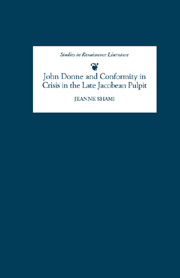Book contents
- Frontmatter
- Contents
- Dedication
- Acknowledgements
- Abbreviations
- 1 “Discreet or religious preachers”: John Donne and the late Jacobean Public Sphere
- 2 “The indiscretion of that foole”: John Knight and the Jacobean Pulpit, 1620–2
- 3 “The fishing of whales”: John Donne's Sermons, 1620–2
- 4 “Faire interpretation”: The Directions and the Crisis of Censorship
- 5 “Wise as Serpents, and innocent as Doves”: Zeal and Discretion in the Pulpit, 1623–5
- 6 “Jesus Wept”: The Journey to Spain and Pulpit Lamentation
- 7 “Blinde buzzards in the choise of a wife”: Sermons and the Moral Marketplace
- 8 “The Lovesick Spouse”: Parliament, Patriots, and the Public Sphere
- 9 “Church-quakes”: Post-Parliamentary Faultlines
- 10 “If the Foundations be Destroyed”: Rules of Engagement
- 11 “Blessed sobriety”: John Donne, the Public Sphere, and Caroline Conformity
- Works Cited
- General Index
- Index to John Donne References
- Index to John Donne's Sermons
- Studies in Renaissance Literature
5 - “Wise as Serpents, and innocent as Doves”: Zeal and Discretion in the Pulpit, 1623–5
Published online by Cambridge University Press: 12 September 2012
- Frontmatter
- Contents
- Dedication
- Acknowledgements
- Abbreviations
- 1 “Discreet or religious preachers”: John Donne and the late Jacobean Public Sphere
- 2 “The indiscretion of that foole”: John Knight and the Jacobean Pulpit, 1620–2
- 3 “The fishing of whales”: John Donne's Sermons, 1620–2
- 4 “Faire interpretation”: The Directions and the Crisis of Censorship
- 5 “Wise as Serpents, and innocent as Doves”: Zeal and Discretion in the Pulpit, 1623–5
- 6 “Jesus Wept”: The Journey to Spain and Pulpit Lamentation
- 7 “Blinde buzzards in the choise of a wife”: Sermons and the Moral Marketplace
- 8 “The Lovesick Spouse”: Parliament, Patriots, and the Public Sphere
- 9 “Church-quakes”: Post-Parliamentary Faultlines
- 10 “If the Foundations be Destroyed”: Rules of Engagement
- 11 “Blessed sobriety”: John Donne, the Public Sphere, and Caroline Conformity
- Works Cited
- General Index
- Index to John Donne References
- Index to John Donne's Sermons
- Studies in Renaissance Literature
Summary
ALTHOUGH fewer sermons were challenged following the Directions, those that survive bear all the marks of anxiety, tension, and pressure that the Directions had identified. To begin with, the Directions had proscribed virulent anti-papism, and yet anti-papist rhetoric continued to dominate the pulpit. What had changed were the uses to which this rhetoric was put, the particular aspects of Roman iniquity that were stressed, and the polarizing effect this rhetoric produced within the church.While the Directions had sought to contain the divisive effects of controversy (by forbidding personal attacks, labeling, and controversy), extant sermons suggest that it had entirely the opposite effect. “Puritan” and “Arminian” emerged as well-understood enemies, while the perceived crisis of religion in England (mirroring the advance of counter-Reformation forces on the continent) was exacerbated by political events in both places.Ongoing negotiations for a Spanish match for Charles, pressure to intervene in the Thirty Years War on the continent, and sectarian threats from the margins of the established church provoked intense public debate. Whereas in the period immediately preceding the Directions, very few controversial sermons had been published, the period following shows an increase in controversial topical application of scriptural texts. And where the Directions had sought to prevent discussion of matters of state, preachers in the late Jacobean years commented obsessively – if more obliquely – on questions of authority and jurisdiction, the duties of their callings, and the application of their texts to present crises, including war and peace, the miseries of continental co-religionists, and the religious and political leadership of their ailing monarch.
- Type
- Chapter
- Information
- John Donne and Conformity in Crisis in the Late Jacobean Pulpit , pp. 139 - 165Publisher: Boydell & BrewerPrint publication year: 2003



